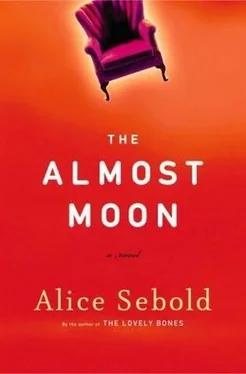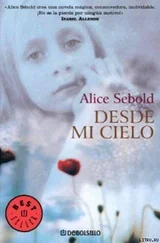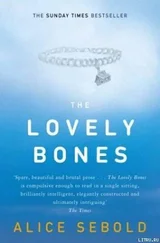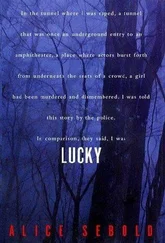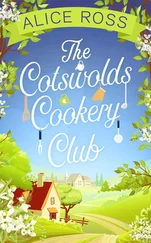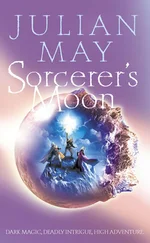The spring evenings stayed light for a long time, but the day had just crested that point where darkness was inevitable and the sun had begun to descend into the line of fir trees that separated our yard from the Levertons’.
I had reached the quilt, and sitting up, I grasped it to my chest. I would not cry. I remember promising myself that, despite the sting in my cheek. What was oddest was that my father’s crushed parsley seemed worse to me than the slap. It was one of the joys he brought into the house for my mother. When he did, clipping rosemary or marjoram or thyme, the scent would linger on his fingers, and he would run them through my mother’s hair to make her smile.
“You can tell your father,” Mr. Warner said, standing above me, “that it is the consensus of the neighborhood that your family should move.”
“We have the right to stay,” I said. I had chosen my side.
He stared at me a moment and then shook his head.
He left the yard, and I wrapped myself tighter in the quilt. It was a memory quilt that we’d bought at the Kutztown Fair. “See that?” the woman who sold it to my father said. “That’s all handwork. No machines at all.”
My father had bought it, sure that my mother would be impressed. She had been. She put it over the arm of the couch, and during aimless afternoons when Natalie was busy and I had to keep myself entertained, I would spread the quilt out over the sofa and make memories up for my family.
“This bright red patch symbolizes a slap on the cheek to Helen when she was sixteen,” I whispered to myself that night in the yard. Already it worked. The slap fell into the hole that was my accumulating past, and I stood, walked inside to clean up the casserole from the floor, and heard the scratchy sound of a big-band radio station as I passed the bathroom door.
The night the men came to our yard, there were two adults within my reach: my mother, hiding in our downstairs bathroom, and Mr. Forrest down the street.
As I grabbed my jacket off the hook by the kitchen door, I spied one of the photographs of my mother from years ago. It was a small one, 4x6, and in it she wore a slip with an ornate lace bodice. The ecru one. It sat propped up among a grouping of knickknacks beside the red-velvet love seat, which to me was the most uncomfortable piece of furniture in existence.
“It encourages people to leave sooner,” my mother would say when I complained.
“What people, Mom?” I’d respond.
I walked over to the photograph and paused. I wanted to hurt her, but she was always crumbling and crying, barking and biting, and to reach her seemed impossible to me. I lifted it and traced the outline of her body with my finger. I slipped the frame into my jacket pocket, and I left as quietly as possible through the front door. There was no way my mother could have heard me over the noise of the radio.
After twilight the streets seemed deserted. No one was outside on their lawns anymore. I thought briefly of what an aerial view of our neighborhood would look like with all the roofs sheared off. In how many houses would happy families be settling in for the night, watching TV with bright bowls of popcorn in their laps? In Natalie’s house her mother would be slowly passing out, assisted by what she called “a little splash.” Natalie would be up in her room, mooning over Hamish Delane, who had just moved to America with his family. Over and over again she’d drawn inscrutable lines on a page until she confided it was “Mrs. Natalie Delane.”
To take the tops off all the houses and mingle our miseries was too simple a solution, I knew. Houses had windows with shades. Yards had gates and fences. There were carefully planned out sidewalks and roads, and these were the paths that, if you chose to go into someone else’s reality, you had to be willing to walk. There were no shortcuts.
His door opened before I could ring the bell.
“I hoped I might see you,” Mr. Forrest said. “Come in, come in. Let me take your coat.”
“I brought you something,” I said.
I reached into my jacket and pulled out the framed photograph.
Mr. Forrest took it from me. I stood in the hallway and looked around, past the porcelain umbrella stand and into the drawing room, which I had seen only from the outside, and into the dining room behind that, which was elevated by three wide wooden steps.
I had been fuming on my way over, and inside his house I could feel the heat of it on my cheeks.
“She’s a beautiful woman, your mother,” Mr. Forrest said, looking at the picture.
“Right.”
“Let’s sit down in the drawing room, shall we?”
It had taken me this long to notice that Mr. Forrest was being incredibly nice to me, even solicitous. I knew how extraordinary this was. Mr. Forrest had no use for almost anyone in the neighborhood other than my parents. He was never rude, but he was perfectly pleasant in a way that, I would realize as an adult, was the suburban equivalent of a stiff-arm.
He had been in our house multiple times over the years, but I had never stepped inside his home. Now I stood on the edge of a silk rug in front of his fireplace, uncertain what to say.
“Sit,” he said. As I did, he whistled loudly, and bounding into the room came Tosh. “I know who you really came to see,” he said, and smiled.
Tosh slowed to an obedient halt in front of Mr. Forrest and sat down on the floor beside him, facing me.
“I owe you a deep apology,” Mr. Forrest said. “I shouldn’t have run away. I’ve never felt exactly comfortable here. In that, I’m not unlike your mother.”
I spied an oval tray near the mantel. It sat on a spindly cherry-wood table, and arrayed upon it were crystal bottles that refracted light. Mr. Forrest followed my eyes.
“Yes, you deserve a drink,” he said nervously. “I know I’d like one. Come, Tosh.” He led Tosh over to the white-slipcovered couch where I was sitting and patted the space beside me. Tosh jumped up and immediately leaned into my side. “That’s a good boy,” Mr. Forrest said.
While Mr. Forrest’s back was to me, I hugged Tosh and held him to me, petting his floppy ears.
“Port is my choice for you,” he said. “We can sip it and talk about disgusting people before putting them aside.”
He handed me the bloodred liquid and went to sit opposite me on a gold velvet chair that made his knees jut up into the air in front of him.
He laughed at himself. “I never sit in this chair,” he said. “It’s called a slipper chair, and ladies used to have them in their boudoirs. It belonged to my great-grandmother.”
“I see you through the window sometimes,” I said.
“A dull thing to look at,” he said.
I had my arm around Tosh and was scratching the space beneath his right ear. His mouth hung open in a panting smile, and occasionally he would tip his head back and look at me. I took a mouthful of the port and immediately wanted to spit it out.
“Sip,” he said, seeing my face. “I did say that, didn’t I?”
What felt like the longest minute in the world passed as I tousled Tosh’s fur and swerved my head around the room.
“Helen, what happened after I left?”
“Forget it,” I said, suddenly not wanting to talk about it, wishing instead that I could be alone with Tosh.
“I’m sorry, Helen,” he said. “In general I leave the neighbors alone, and if I don’t go flouncing over to their houses, they let me be.”
“His friend hit me,” I said.
Mr. Forrest put down his glass on the marble-topped table beside him. He looked as if he too had been hit. He inhaled.
“Helen, I’m going to teach you two very important words. Ready?”
“Yes,” I said.
Читать дальше
